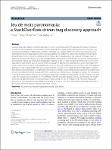Item Infomation
Full metadata record
| DC Field | Value | Language |
|---|---|---|
| dc.contributor.author | Yi, Yang | - |
| dc.contributor.author | Ying, Li | - |
| dc.contributor.author | Kai, Chen | - |
| dc.date.accessioned | 2023-04-10T03:35:53Z | - |
| dc.date.available | 2023-04-10T03:35:53Z | - |
| dc.date.issued | 2023 | - |
| dc.identifier.uri | https://link.springer.com/article/10.1186/s42400-023-00153-0 | - |
| dc.identifier.uri | https://dlib.phenikaa-uni.edu.vn/handle/PNK/7713 | - |
| dc.description | CC BY | vi |
| dc.description.abstract | Locating bug code snippets (short for BugCode) has been a complex problem throughout the history of software security, mainly because the constraints that define BugCode are obscure and hard to summarize. Previously, security analysts attempted to define such constraints manually (e.g., limiting buffer size to detect overflow), but were limited to the types of BugCode. Recent researchers address this problem by extracting constraints from program documentation, which shows the potential for API misuse. But for bugs beyond the scope of API misuse, such an approach becomes less effective since the corresponding constraints are not defined in documents, not to mention the programs without documentation In this paper, inspired by the fact that expert programmers often correct the BugCode on open forums such as StackOverflow, we design an approach to automatically extract knowledge from StackOverflow and leverage it to detect BugCode. | vi |
| dc.language.iso | en | vi |
| dc.publisher | Springer | vi |
| dc.subject | Locating bug code snippets | vi |
| dc.subject | BugCode | vi |
| dc.title | Jeu de mots paronomasia a StackOverflow-driven bug discovery approach | vi |
| dc.type | Book | vi |
| Appears in Collections | ||
| OER - Công nghệ thông tin | ||
Files in This Item:

